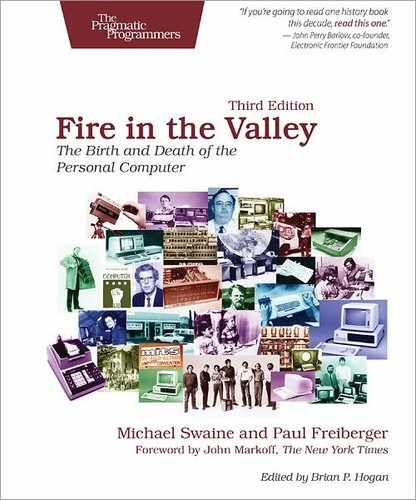The Bottom Line
If they have a contest as to who is the best negotiator in the industry, I’ll withdraw to Seymour’s fine abilities. Seymour is a master. And I was just a poor child.
–Bill Gates
Seymour Rubinstein has said publicly that he left IMSAI to establish a software firm. But with his sharp business sense, Rubinstein must have seen the financial foundation dissolving under the house of IMSAI. More important, however, he chose to bring his business skills to a software industry characterized by haphazard marketing.
Creating a Consumer Market for Software
The lack of business expertise among its executives was holding back the software industry, Rubinstein felt. He decided that his firm would not sell to manufacturers, as Gary Kildall, Gordon Eubanks, and Bill Gates had been doing, nor would it sell by mail to end users, as Michael Shrayer, Alan Cooper, and Keith Parsons did. The number of computer stores wasn’t large, but it was growing. Rubinstein decided that his new firm, MicroPro International, would sell only to retailers.
But first he needed some software to sell, and Rubinstein knew where to turn for that. The day he left IMSAI, he visited another ex-employee, Rob Barnaby, who had headed IMSAI’s software-development division. Recalling the exhaustive programs Barnaby wrote to test Eubanks’s CBASIC and other examples of Barnaby’s clever and painstaking programming, Rubinstein knew he wanted Rob Barnaby for his company. So, he went out and got him. By September, Barnaby had completed MicroPro’s first two products, SuperSort and WordMaster. The first was a data-sorting program and the second was a text editor that Barnaby had begun working on while still at IMSAI.
Although sales for these two products grew rapidly ($11,000 in September 1978; $14,000 in October; $20,000 in November), Rubinstein felt the market could handle much more; he realized that Shrayer had whetted the appetite of computer owners. MicroPro was inundated with requests for a word processor like Electric Pencil. Not one to shun an opportunity, Rubinstein brought out a similar item. Barnaby’s new program, WordStar, was an elaboration of WordMaster into an actual word processor, and it quickly sold more copies than Electric Pencil or any other word-processing rival.
WordStar was also superior to Electric Pencil. Electric Pencil offered word wrap, the feature that allows users to continue typing after the end of a line is reached. But a fast typist could type quickly enough to cause the software to miss one or two characters while the word wrap “carriage” was returning. WordStar overcame that problem and offered another improvement in the form of a what-you-see-is-what-you-get display. In other words, text appeared on the screen in virtually the same form as it did when it was printed.
WordStar soon had rivals. In mid-1979, when MicroPro released WordStar, Bill Radding and Mike Griffin in Houston were almost ready to release their word processor, Magic Wand, a worthy competitor to WordStar.
Rubinstein offered WordStar and his other programs to dealers on a per-copy basis. Michael Shrayer had also investigated that option, but few computer-distribution centers or computer stores existed at the time. By late 1978, when MicroPro International commenced sales, the number of computer stores had grown exponentially. Along with two other companies—Personal Software, with its VisiCalc for the Apple, and Peachtree Software, with its General Ledger program—MicroPro established the standards by which application-software developers did business. By selling its product like any other consumer item, the software industry gained self-respect, credibility, and a financial bonanza.
The Challenge of Software Piracy
Software, these early developers understood, was a product like, say, a wristwatch or a stereo set was a product; however, software was different in one important respect. Software could be appropriated without removing the original item. A thief could copy someone else’s program, easier and faster than making an audio tape of someone’s Pink Floyd album. From the earliest days of the industry, the ubiquitous problem of unauthorized copying outraged many programmers, who saw the fruits of their ingenuity copied and recopied without the slightest monetary gain.
Bill Gates was the first programmer to call attention to the piracy problem. In January 1976, he wrote an “Open Letter to Hobbyists,” which was published, among other places, in the Homebrew Computer Club newsletter. In the letter, Gates lambasted the widespread copying of paper-tape copies of his BASIC and called the hobbyists who copied the program thieves. “The amount of royalties we have received from sales to hobbyists makes the time spent on Altair BASIC worth less than $2 an hour,” Gates wrote. “Why is this? As the majority of hobbyists must be aware, most of you steal your software. Hardware must be paid for, but software is something to share. Who cares if the people who worked on it get paid?”
Gates’s diatribe had no effect on hobbyists except to make them even more angry at the $500 MITS charged for Gates’s BASIC. Hobbyists could see no justification for the price—which was as much as the computer itself—especially because without BASIC the machine was pretty much useless. They felt it should be included with the machine.
From time to time, software developers tried to protect their programs from being copied by using subtle software tricks that either prevented a disk from being copied or that booby-trapped the copied program. Again and again, such schemes failed for one fundamental reason—if a copy-protected program can be written, it can also be cracked. Most companies began to view piracy as a cost of doing business.
The problem was easier to take given that business was good—very good. Soon software became as solid a reason to buy hardware as the computer itself. It was apparent that software was becoming a serious business. In fact, it was an easier business to get started in—and possibly get rich in—than hardware. The only cost of making software, as one wag put it, was printing the serial numbers.
The growing software market soon attracted more aggressive entrepreneurs.
